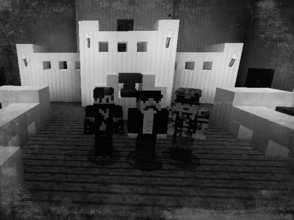Czechoslovakia: Difference between revisions
>Chnapak No edit summary |
>Chnapak |
||
| Line 1: | Line 1: | ||
Test | |||
== '''Czechoslovakian Leadership''' == | == '''Czechoslovakian Leadership''' == | ||
Revision as of 14:44, 11 June 2019
Test
Czechoslovakian Leadership
Czech leadership is fairly poor. Governors have little control over their region, the King is the only official that has power over the populace of any region. In war time leadership has a chance of crashing down, possibly resulting to a civil war or unrest amongst the populace though this hasn't happened yet.
Czechoslovakian Ranks
Czechoslovakian ranks are as follows:
- Citizen - Have little to no power in leading the country. Often are conscripted during war time.
- Mayor - Are in control of their town and the people inside. Often are conscripted during war time due to manpower shortages.
- Governor - Are in control of their region and the people inside. Can act as a General during war time due to little to no military leadership.
- Chancellor - Has veto power in Parliament and is the 2nd in command to the King. Can act as a General during war time due to little to no military leadership.
- King - The ruling power throughout all of the nation. Is able to command every Czech soldier.
Czechoslovakian Auxiliary Ranks
Czechoslovakian auxiliary ranks are as follows:
- Allies - Helps Czech soldiers in battles.
- Diplomats - Can talk privately with the King and other high ranking officials. Has some power, but this can be veto-ed by Chancellors and the King.
- Foreign Leaders - Helps Czech leadership in battles. Also commands their respective troops.
Regions of Czechoslovakia
Czechoslovakia consists of five regions.
- Bohemia
- Moravia
- Bornholm
- Central Silesia
- Southern Silesia
- Slovakia
- Hungary
These regions for the most part follow the laws of the King, but Governors are allowed some leeway in terms of laws of their region.
History of Czechoslovakia
On the 18th of May Dymoslaw bought out Dacian Empire (Prague and Bratislava) and renamed it to Silesia making the new formed Silesia have 3 cities. Dymoslaw changed the mayor of Prague from Zebbs to Probatski. The next they morning they got 2 new towns Budapest and Karlovy-Vary, however the town, Karlovy-Vary, didn't join officially.
After a few weeks Karlovy-Vary and Bratislava's annexation was finally made official, while the name changed from Silesia to Czechoslovakia.
18th May 2019 - 11th June 2019
Past Battles
Battle of Budapest-Chlebmiasto (Silesia vs Somerset)
KingVarin skirmishes Silesian (Czechoslovakian) builders who were constructing the Budapest-Chlebmiasto road. This sparks off a battle. Both sides call in reinforcements and the troop numbers swell up to 10-20 in total. Battle ends in minor Somerset victory.
Czechoslovakia's Military Power
Czechoslovakia's military leaves something to be desired. Lack of equipment and gold, not being able to field more than 10-15 troops at once, and having it's military made up of mostly conscripted men are all reasons to why Czechoslovakia is an easy target to hit and run missions and quick conflicts. Enemies are able to attack with less men and win if they catch Czech defenders off guard.
Czechoslovakia's Military Leadership
Czechoslovakia's military leadership is non-existent. In time of war governors can act as generals, but often they don't and instead Czech soldiers go leaderless most of the time.
Czechoslovakia's Soldiers and Equipment
Czech soldiers are poorly equipped and more often than not don't get basic equipment and will have to fight with whatever they have, be it shovels, axes, damaged swords and more. The soldiers are also poorly trained, as they are made up of mostly conscripted men as Czechoslovakia doesn't have many people.
Czechoslovakia's Economic Power
Czechoslovakia's economy is lacking badly in some areas. No gold means no expansion, no expansion means not being able to keep more people, less people means a worse military as you have to conscript much more of your population than your enemy. Many of Czechoslovakia's problems arise from a terrible economy. Having little to no gold means you have lots of small towns that just can't expand. This problem is present in all of Czechoslovakia's regions in some form, shape or size but it's most prevalent in Hungary, where Chlebmiasto and Budapest lays.
